


By T. A. Benjaminsen (2025)
Journal Article in Nytt Norsk Tidsskrift, Oslo
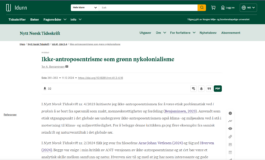
In Nytt Norsk Tidsskrift no. 4/2023, I criticised non-anthropocentrism for being ethically problematic by ignoring issues such as power, human rights and distribution (Benjaminsen, 2023). Applied as an ethical starting point in the Global South, non-anthropocentrism also undermines the climate and environmental cause by standing in opposition to climate and environmental justice. To substantiate this criticism, I gave several examples from Sámi reindeer husbandry and nature conservation initiatives in the Global South. In Nytt Norsk Tidsskrift no. 2/2024, I received responses from the philosophers Arne Johan Vetlesen (2024) and Sigurd Hverven (2024). Both agreed with my criticism of the ANT version of non-anthropocentrism and that there should be an analytical distinction between society and nature. Hverven even says that I have some interesting and good points that are thought-provoking and should be taken seriously.
By I. Poudiougou (2025)
Journal Article in Cahiers d’Études africaines, Paris
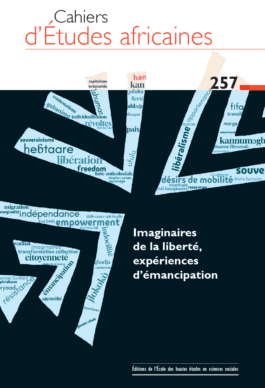
The armed jihadist insurgency in central Mali has given rise to a counter-insurgency by self-defence groups such as that led by Dan Nan Ambassagou. Whether they are jihadist or self-defence fighters, these men-at-arms from subaltern social strata seem to have made the AK-47 the instrument of emancipation par excellence. Their quest for emancipation from the dominations rooted in local socio-political and historical structures takes different routes depending on whether they claim to be jihadists or self-defenders. This article argues that armed violence is reshaping the internal social relations of Fulani and Dogon societies in central Mali. The contestation of domination is fuelled by the denunciation of collusion between traditional Fulani political elites and civil servants on the one hand, and the questioning of rent-seeking practices by the urbanised Dogon educated elites on the other. Using ethnographic data, the article illustrates how such a quest mobilises different ways of legitimising violence, such as the call for jihad, resistance against a “new enslavement” and reciprocal accusations of dispossession of land by the Dogon and the Peul.
By T. A. Benjaminsen (2024)
Book published by Edward Elgar Publishing, Cheltenham
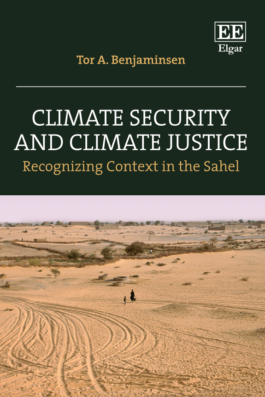
My first visit to Mali was in the dry and hot season of 1987. This was also my first fieldwork and visit to Africa south of the Sahara. The purpose was to collect data for a Cand. Scient. research project in Landscape Ecology and Resource Geography at the University of Oslo. This fieldwork took place just after the big Sahelian drought of 1984–85 with all the global media attention that followed. It was also the time when a new concept – ‘sustainable development’ – was born, which represented a renewed interest in the environment in the midst of a neoliberal era. The answers to global environmental problems were seen to be more economic growth, not only in poor, but also in rich countries – a dominant paradigm that has continued until today, but more recently under the labels ‘green growth’ or ‘ecomodernism’ in the context of transformation to low-carbon societies. This book builds on 37 years of recurrent research visits to Mali and it draws the lines and connections between the various themes that I have worked on over the years – desertification, pastoralism, land-use conflicts, Tuareg and jihadist rebellions. One main aim has been to discuss the background to the current Sahelian crisis. I argue that understanding this crisis requires a political ecology approach that combines historical and materialist perspectives with a focus on the context of people’s motivations and agency. I also argue that ‘sustainable development’ forms the backdrop of the current jihadist rebellions in the Sahel.
Book launch: Climate Security and Climate Justice in the Sahel - YouTube
By I. Poudiougou (2024)
Journal article in Revue Internationale des Études du Développement
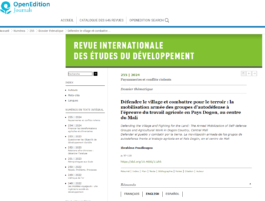
At 4 am on 8 June 2022, a group of 350 jihadists surrounded Makou, a village in the Bandiagara region. Their leader forced the inhabitants to leave. Makou's 422 households were scattered among neighbouring villages. This article analyses how the emergence of armed groups normalises violence and redraws socio-political relations in the « terroirs historiques » of central Mali. It examines how Dan Nan Ambassagou combines armed resistance against jihadist groups with peasant life in the Bandiagara region.
By T. A. Benjaminsen and B. Ba (2024)
Journal article in Political Geography
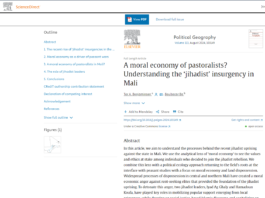
In this article, we aim to understand the processes behind the recent jihadist uprising against the state in Mali. We use the analytical lens of ‘moral economy’ to see the values and ethics at stake among individuals who decided to join the jihadist rebellion. We combine this lens with a political ecology approach returning to the field's roots at the interface with peasant studies with a focus on moral economy and land dispossession. Widespread processes of dispossession in central and northern Mali have created a moral economic anger against rent-seeking elites that provided the foundation of the jihadist uprising. To detonate this anger, two jihadist leaders, Iyad Ag Ghaly and Hamadoun Koufa, have played key roles in mobilizing popular support emerging from local grievances, while drawing on social justice-based Islamic discourse and capitalizing on external support. The Tuareg and Fulani moral economic grievances have different origins, although for both groups a defence of pastoralism is at the core. When the uprising became ‘jihadist’ from 2012, and when the Fulani started to join, it became also attractive to the subordinate classes who saw the rebellion as an opportunity for social liberation. Frequent references to the Macina Empire of the 19th century as the golden period of Fulani pastoral power has also played a key role in the emergence of a narrative about pastoral resistance to a Bambara-dominated state.
By H. Svarstad and T. A. Benjaminsen (2024)
Book chapter in Elgar Encyclopedia of Environmental Sociology
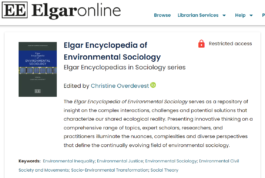
Political Ecology (PE) is a critical and interdisciplinary field in which environmental change, and struggles are studied as they play out in and across cases in the Global South and North. These studies usually combine analyses of material as well as discursive dimensions, and they often focus on power, marginalization and conflicts related to capital accumulation, injustice and neocolonial practices. The field emerged in the 1980s and the politics and social construction of environmental knowledge, combined with empirical investigations, have been among the main themes from the outset. Although sociologists do not dominate in the global PE community, central theories in the PE literature are rooted in classic sociology and critical social science theory more broadly. PE studies are based on combinations of various power perspectives and in particular Weberian actor-oriented theory; Marxist material-economic and structural views on power; discursive ideas about power inspired by Gramsci; and Foucault’s notion of governmentality.
By I. Poudiougou (2023)
Journal article in Anthropos
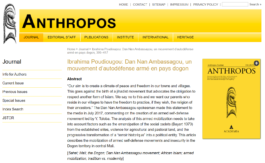
“Our aim is to create a climate of peace and freedom in our towns and villages. This goes against the birth of a jihadist movement that advocates the obligation to respect another form of Islam. We say no to this and we want our parents who reside in our villages to have the freedom to practice, if they wish, the religion of their ancestors.” The Dan Nan Ambassagou spokesman made this statement to the media in July 2017, commenting on the creation of an armed self-defense movement led by Y. Toloba. The analysis of this armed mobilization needs to take into account factors such as the emancipation of the social cadets (Bayart 1979) from the established elites, violence for agricultural and pastoral land, and the progressive transformation of a “terroir historique” into a political entity. This article describes the mobilization of armed self-defense movements and insecurity in the Dogon territory in central Mali.
By T. A. Benjaminsen (2023)
Journal article in Nytt Norsk Tidsskrift
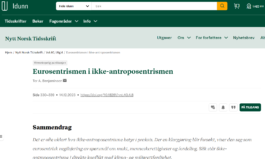
It is often unclear what non-anthropocentrism means in practice. Where clarification is attempted, it turns out to be a Eurocentric neglect of issues of power, human rights and distribution. In this way, non-anthropocentrism is in direct conflict with climate and environmental justice.
The Risks of Ecological Security
By T. A. Benjaminsen (2023)
Journal article in New Perspectives

Both quantitative peace and conflict studies (e.g. Buhaug 2010; Theisen et al., 2013; Koubi, 2019) and case-based political ecology (e.g. Benjaminsen et al., 2012; Abrahams and Carr 2017; Benjaminsen and Ba, 2021) have questioned assumptions about climate change as a driver of violence and insecurity, although there may be indirect pathways under certain contexts. My own positionality in debates about climate security and in these comments on the book discussed in this Forum (McDonald, 2021) is rooted in my background in political ecology research on land-use conflicts in the Sahel where I have seen the need to push back at simplistic and apolitical narratives about giving climate a leading role to explain crisis and conflict in the region.
Conservation, Land Dispossession, and Resistance in Africa
By C. Cavanagh & T. A. Benjaminsen (2022)
Book chapter in The Oxford Handbook of Land Politics
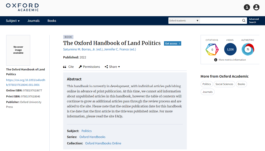
While conservation organizations work to expand the network of protected areas in Africa to 30 percent or more of terrestrial land area, the flip side of such expansion is the mounting dispossession of rural land users, including subsistence-oriented farmers and pastoralists. This may result in forced migration to urban areas or elsewhere, but also to various forms of resistance: both covert and more overt instances of opposition to conservation. This chapter examines the risks and determinants of these variable constellations of overt resistance. In doing so, it assesses whether or to what extent recent developments in violent resistance, including the growth of jihadist groups, can be linked to the expansion of a top-down environmental conservation agenda.
LANDRESPONSE
is an NMBU project, funded by the European Research Council.
Address:
Postboks 5003
1433 Ås
Organization number: 969159570
Visitor addresses
Phone: 67 23 00 00
E-post